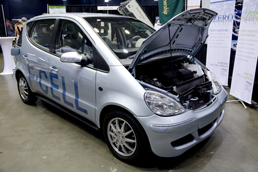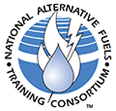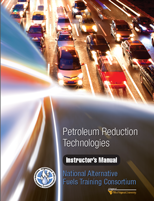Petroleum Reduction Technologies
Available as a two-day course or individual four-hour workshops, this course helps participants understand the variety of alternative fuels, learn how to work toward energy independence, and understand technologies that support petroleum reduction.
Petroleum Reduction Technologies (PRT) is aimed at reducing petroleum consumption and its effects on the economy, health, and the environment.
This course is designed specifically to raise awareness and foster a greater understanding of alternative fuels, alternative fuel vehicles, advanced vehicle technologies, petroleum reduction technologies, fuel economy, idle reduction, and related technologies.
SCHEDULE A TRAINING or call us at ![]() (304) 293-7882 for more information.
(304) 293-7882 for more information.
Course materials provided:
- Participant Manual – ISBN 978-1-933954-42-4
- Includes review questions and learning activities
- Each module of the Participant’s Manual contains text, illustrations, explanatory figures and tables, module review questions, and a list of key terms and abbreviations
Course designed for:
- Government Officials / Decision Makers
- General / Consumers
- Automotive Technicians
- Fleet Managers
- Secondary Education
- Post-Secondary Education
- Code Officials / AHJs
- Construction / Contractors


Individual modules of this course are available. Click the links below to learn more.
- Petroleum Reduction Technologies: Biodiesel
- Petroleum Reduction Technologies: Ethanol
- Petroleum Reduction Technologies: Natural Gas
- Petroleum Reduction Technologies: Propane
- Petroleum Reduction Technologies: Hydrogen
- Petroleum Reduction Technologies: Electric Drive
- Petroleum Reduction Technologies: Fuel Economy
- Petroleum Reduction Technologies: Idle Reduction
Taught by certified NAFTC instructors, this two-day course will enable you to:
- Describe petroleum reduction technologies and related vehicles.
- Explain the basic history of petroleum reduction technologies.
- Describe how petroleum reduction technologies may help the environment.
- Explain how petroleum reduction technologies may help stimulate the economy.
- Describe what energy security is and how to use petroleum reduction technologies to attain it.
- Explain how to implement green fleets.
- Learn about incentives for converting to fuel efficient fleets.
- Learn about the availability and cost of petroleum reduction technologies and related vehicles.
- Identify the advantages of petroleum reduction technologies.
- Understand how petroleum reduction technology related vehicles perform, compared to conventional vehicles.
- Describe energy security and how petroleum reduction technologies can be used to attain it.
Course outline:
- Day One
- Reducing petroleum consumption
- Reducing emissions
- The need for alternative fuels and advanced technology vehicles
- Federal requirements
- Definition of alternative fuels
- State and local requirements
- Consumer acceptance
- Consumer demand
- Biodiesel
- Ethanol
- Natural Gas
- Day Two
- Propane
- Electric drive vehicles
- Hydrogen
- Fuel economy
- Idle reduction




